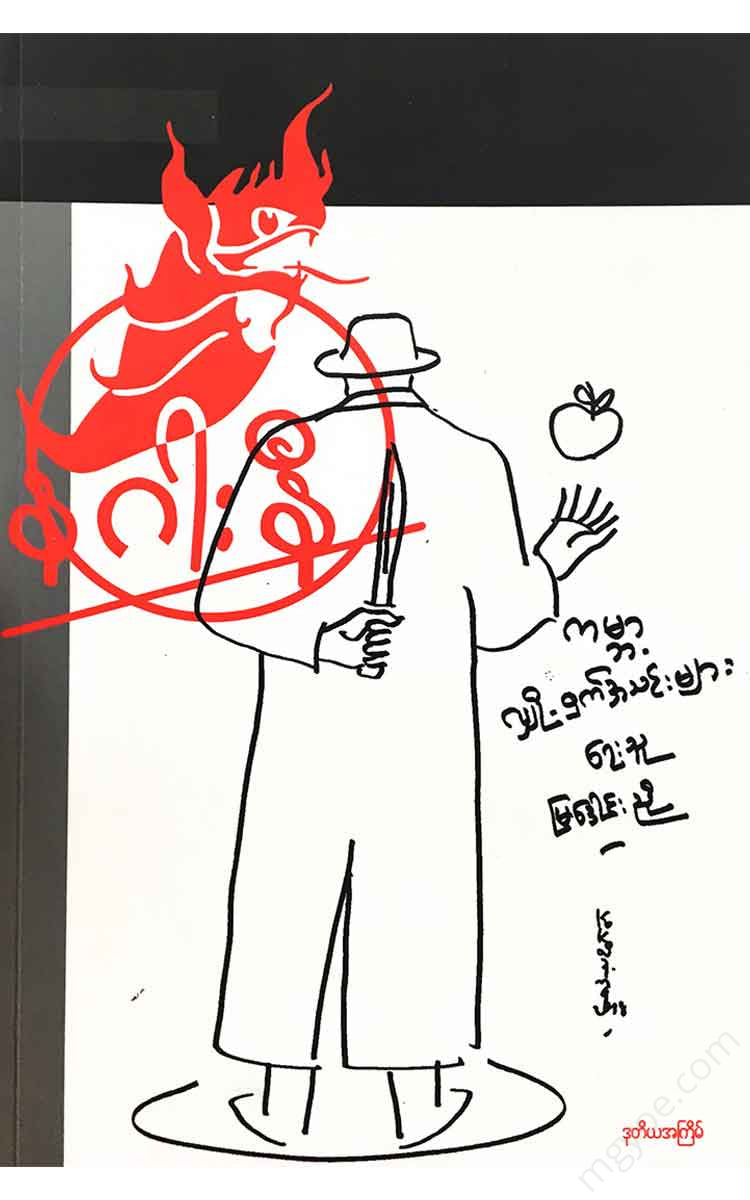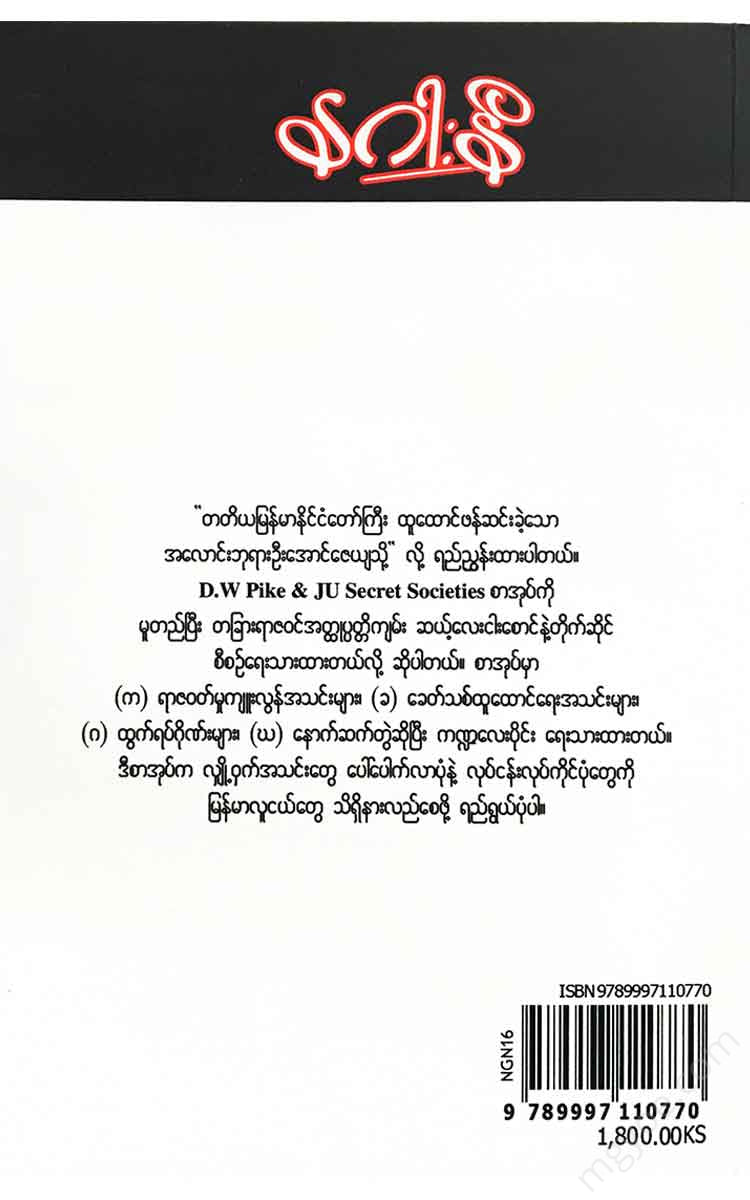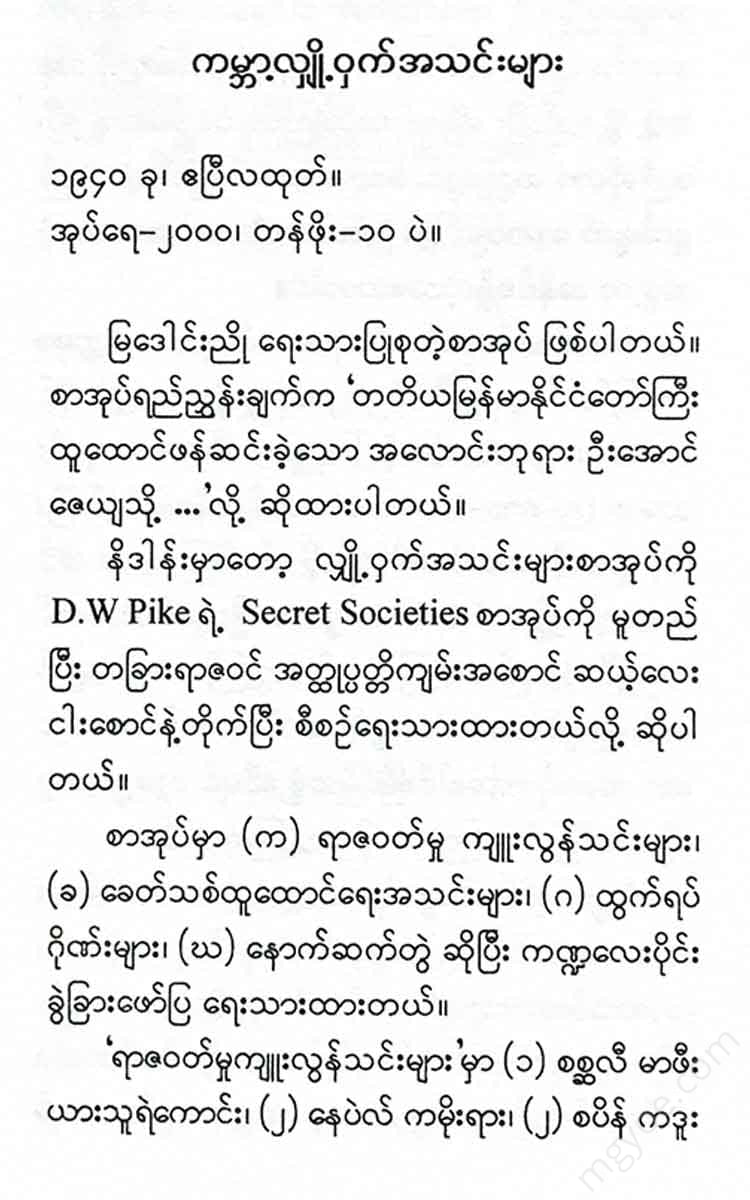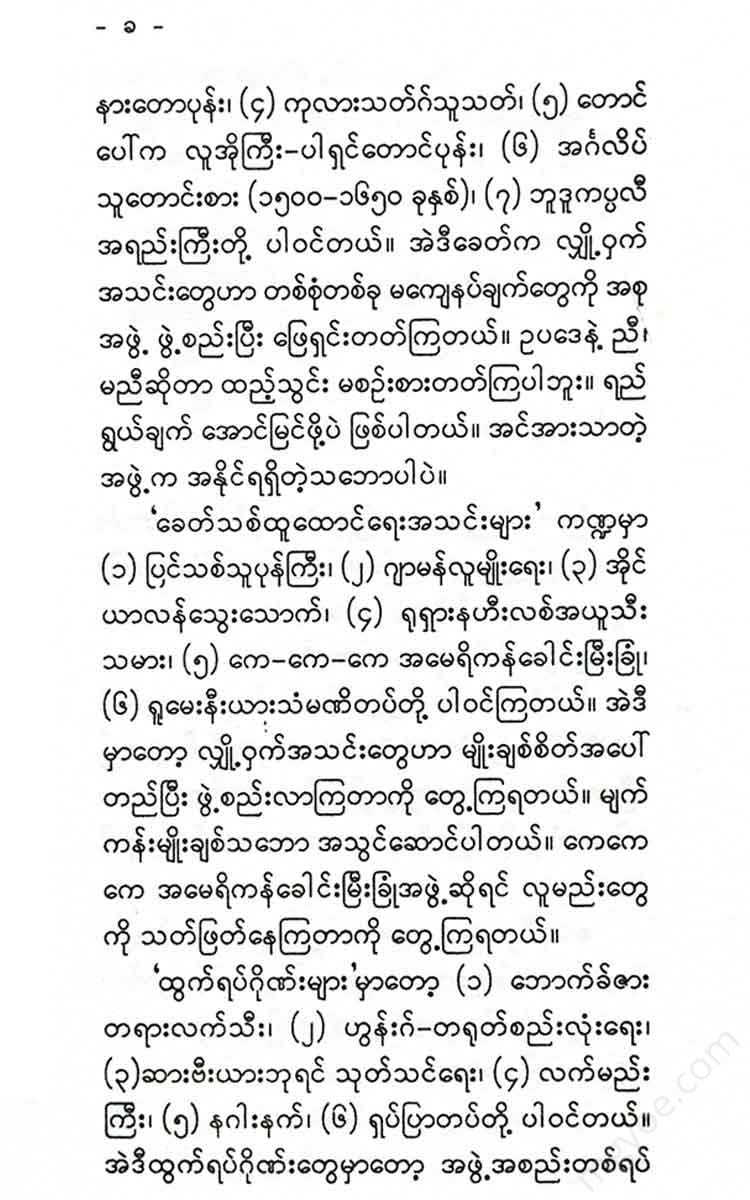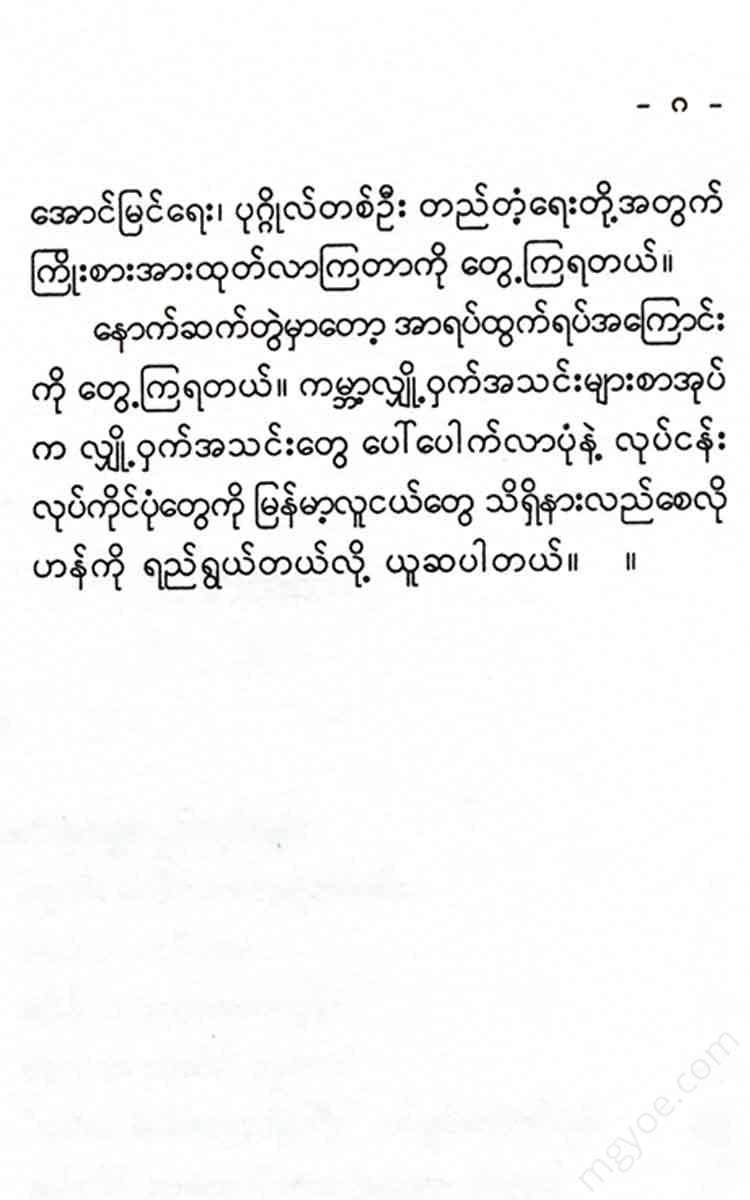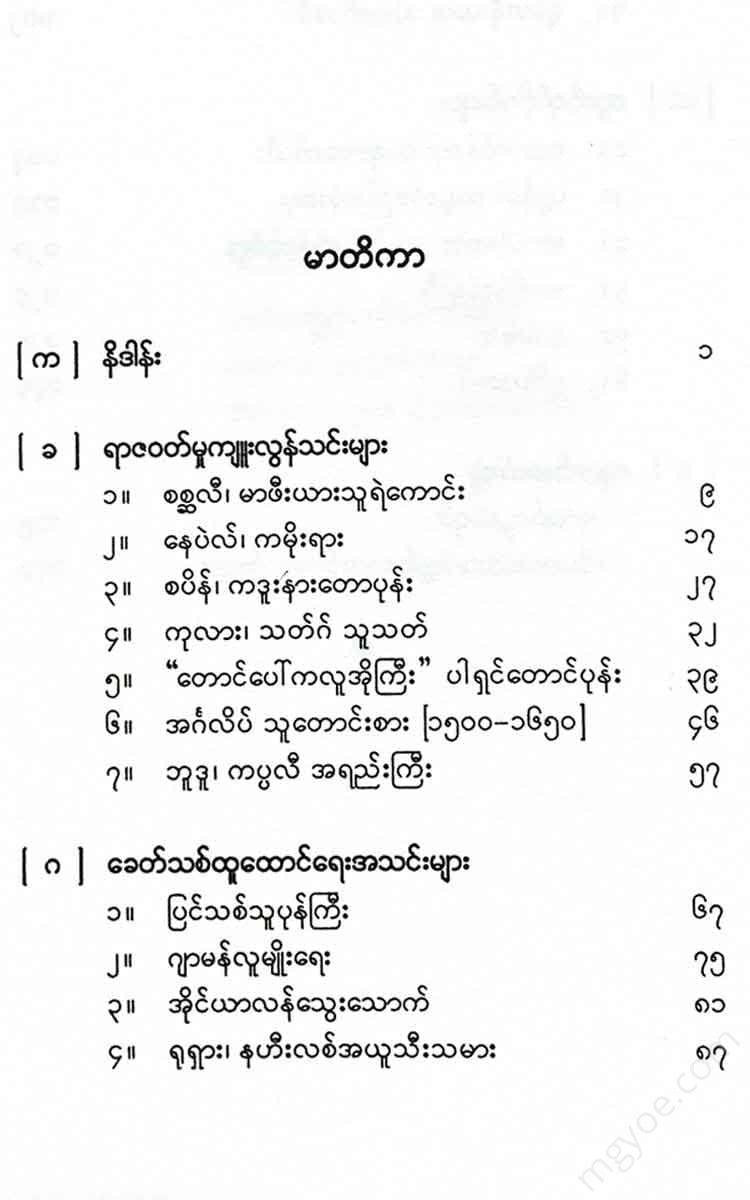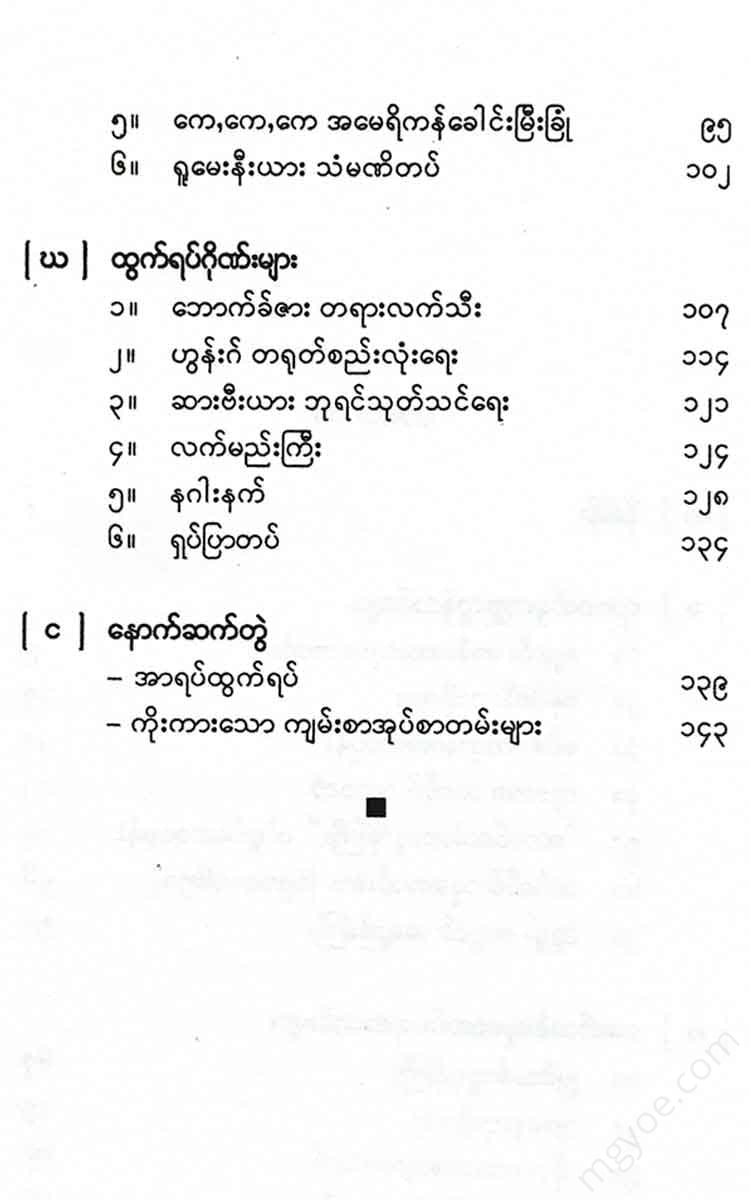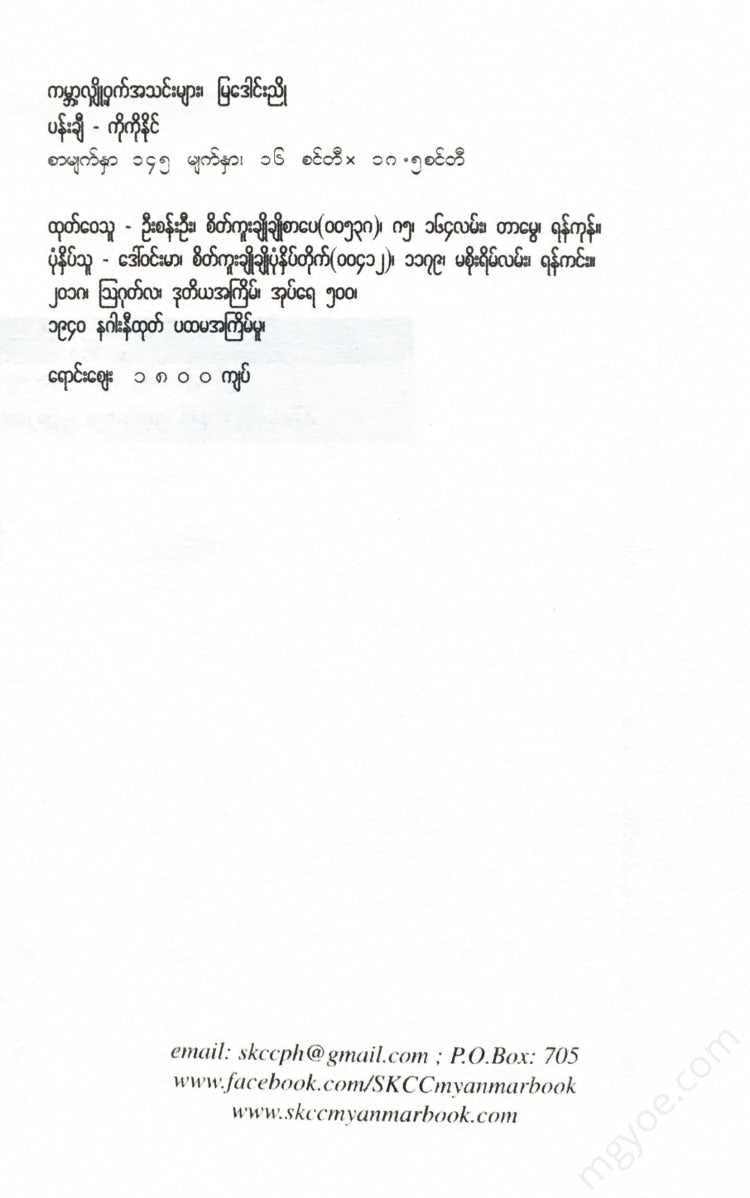စိတ်ကူးချိုချိုစာပေ
Mya Daung Nyo - Secret Societies of the World
Mya Daung Nyo - Secret Societies of the World
Couldn't load pickup availability
“Hide the cat’s claw” is a Burmese proverb. If something is important, it will be revealed. “Don’t let the Burmese see it before it’s done,” the proverb conveys a sense of secrecy.
People are intrigued by secrecy. People want to know about secrecy. They want to be secretive. Psychologists might call it the innate instinct. Everyone wants to be "involved" in something secretive.
They like to have valuable things in secret. The young woman who walks secretly with her face covered by an umbrella, the people want to see her face carefully. The young woman who walks openly with her face covered is often ignored and ignored. This is an example of a social issue.
Secrecy is the "face" of publicity, and one reason for secrecy is to keep it from being known before it is done. That is why secret societies do not openly flaunt their activities until they have achieved their goals.
Secrets are the birth of courage, adventure, and sacrifice. Secret societies capture the minds of people. They are short-lived and on the move. Without secrecy, corruption, competition, and partiality lead to disrespect, irresponsibility, disorganization, and disillusionment. “Secret societies can work more efficiently than “open” societies.
Secret societies, like secret societies, often hold the country in check. Every ruler is not without secrets, but with the support of the secret societies. The Chinese warlord Madam Chiang Kai-shek was a member of the Hong Kong China Unity Secret Society.
It was approved. Even the first president of China, Sun Yat-sen, was a member of this association. The republic was created.
Look at the history of Myanmar, the people of Myanmar were scattered because of secret societies. Kings Yan Naung, Tabin Shwe Htee, Bayint Naung, Alaung Pagoda, the first ruler of Amarapura, Shwe Bo, and other kings, all of whom were involved in the country's assassinations with bloodthirsty troops, loyal guards, and trusted people. If it's important, aren't they close by blood?
Regarding this, we read the following in the “Burmese King’s Administrative Documents” regarding blood-drinking (secret societies).
"Same blood, close blood - When there are few people, when there are other people besides close blood relatives, and when there are strangers, when someone pricks the arm of someone and drinks the blood, it is considered that the blood is the same. After forming a group of people, they drink the blood and become the leader among them. (1- Being able to keep the subordinates with love and affection. 2- Being able to tolerate cold and heat. 3- Not prioritizing self-interest and wealth, and having the courage to work for the progress of subordinates and 4- Having the six qualities of a patron) are often promoted as big blood or big blood drinkers.
“A group of people who drink blood and act in a unified manner and follow the rules of blood drinking is called a blood drinking group. The word blood drinking is often abbreviated as “go” instead of being written as a separate word for blood drinking. The term blood drinking group is often used in Burmese decrees, decrees, royal documents, and surveys.
“Those who plan to become kings, as mentioned, are called Ye Yi Pe, even the fact that they drink blood. 912 of the 912 people who proposed to become the king of the White Elephants of Hanthawaddy, 68 people who proposed to become the king of Alaungmindha, 1113 people who proposed to become the king of the first city of Amarapura, 12 people who proposed to become the king of the first city of Amarapura, 1143 people who proposed to become the king of the first city of Amarapura, each consisted of 12 people who drank blood. If they were just people, they were called “Ye Yi Pe.” If they had horses, they were called “Myin Yi Pe.” There are also many poems composed in Lankasi about the relationship between people who drink blood and those who drink horse blood. They are often called “Yeting Lanka-Yeting Mawkun.”
"If sixty-eight,
The most powerful thing in the world. You have a plan.
"True" -
"The king of the gods is in the strong Lanka."
“When the British began to annex Upper Burma, it was also evident that the aforementioned groups of bandits and bandits, who were loyal to the king, formed alliances and drank blood, and emerged powerfully.
It is true that it is not only the Burmese people who practice bloodletting, but also the Ta Lai, Shan, Yun, Karen, Kachin, and Chin peoples who practice bloodletting in the same way as mentioned above.
As the saying goes, “When it matters, blood is always near.” When a country is in trouble, people who are close to blood gather together, in other words, choosing people who agree and drinking blood, was still evident as late as 1143 Burmese calendar year.
As mentioned, bloodletting is not an open business. It is a form of rebellion that is closely related to blood, and bloodletting can only be done secretly. Isn't it because of the 68 secret followers of Alaungpaya Myinyi that Myanmar emerged as the third state? Isn't it possible for the Burmese to be free from the yoke of the one line and live on equal terms with their fellow citizens?
Apart from the secret societies that are purely criminal, many secret societies also include wealthy individuals. Secret societies are the powerful weapon of the weak to overthrow the powerful and oppressive.
Secret societies are evident in the annals of history. Secret societies have appeared in every nation, every country, and every era. They live in secrecy, following the worldly laws of each country.
In ancient empires such as China, Rome, and Egypt, secret religious sects emerged. False monks and monks who made a living by deceiving the gods
There were secret societies. During the Pagan period in Burma, over eighty great leaders secretly formed groups and forced Pagans to eat fat, eat bones, and perform various rituals, such as sending out flowers and performing dragon worship.
The sorcerers, astrologers, fortune tellers, and fortune tellers have formed secret societies and have been practicing their craft in China, Japan, Mexico, and the Middle East since ancient times. The "Meji" sorcerers of Persia, the Brahmin Brahmins of the Kala, and the hermits of ancient Britain all made their living by dressing in secret and traditional attire. All the great ancient religions practiced secret rituals. In ancient tombs, ossuaries, cave urns, caves, and mountain cliffs, stone and stone archaeologists have unearthed the remains of secret societies that emerged in ancient times.
From the 11th to the 14th centuries, Europe was in the midst of a great “Middle Ages” of religious wars. Christians and pagans fought each other. Secret religious orders, known as “Nirvana Paths,” emerged. Secret “Inquisitions” were established by the Roman Catholic Church. These orders brutally executed anyone who was not baptized. They were a major part of European history.
The sects of alchemy, mysticism, tapasya, and asceticism have also sprung up like mushrooms all over the world. It is said that people who share the same beliefs and beliefs secretly form sects with their superiors and masters.
The Freemasonry “Cut the Head” Society has been around for two centuries and is still thriving today. There are 25,000 societies in the world. Over three million members. The program is secret. However, the secrecy in the organization of the ceremony makes it a secret society.
